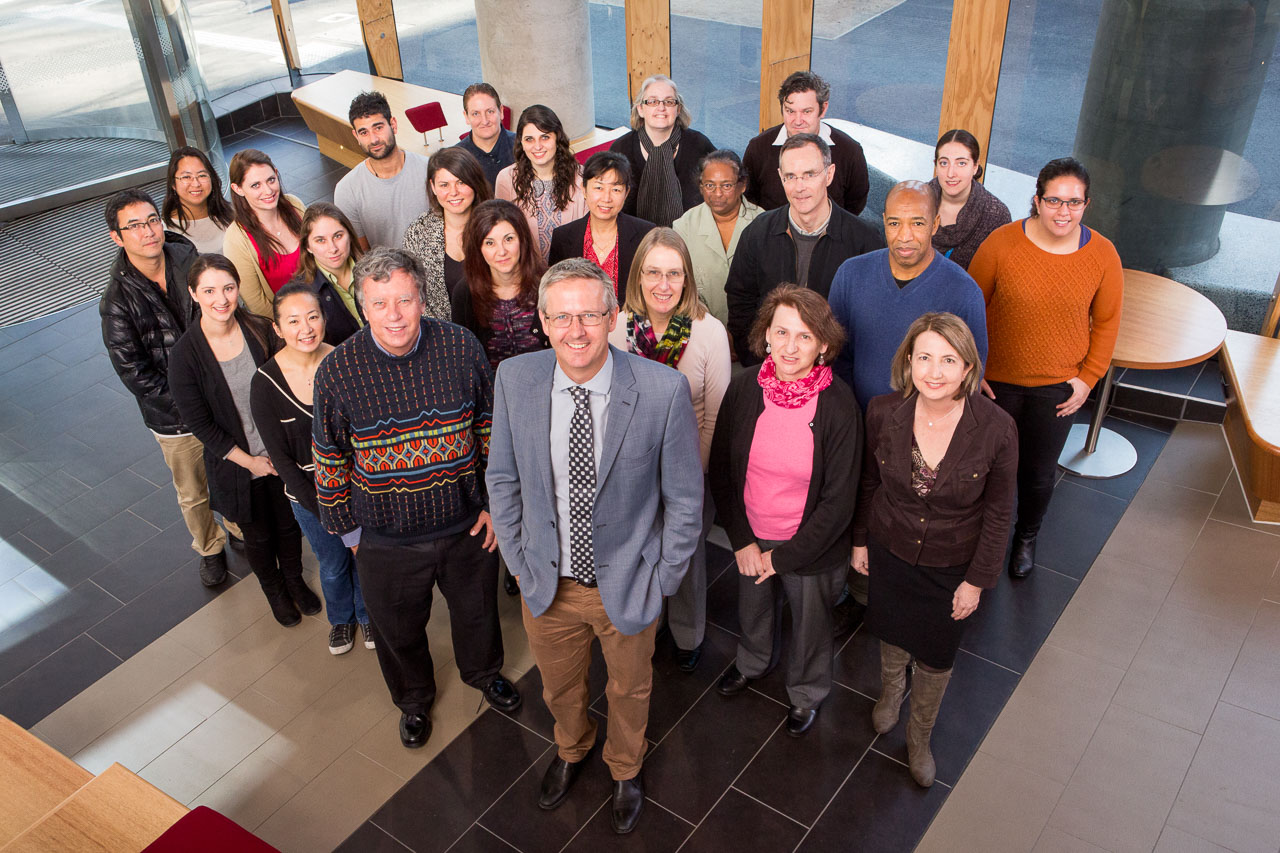-
Research Groups
-
Howden Group
Research from Professor Ben Howden’s group uses genomics, molecular biology, epidemiology and clinical studies to address a broad range of issues related to invasive bacterial diseases in humans, especially those caused by staphylococci, enterococci and other antimicrobial-resistant species. Additionally, working closely with scientists in the MDU PHL, they investigate the epidemiology, evolution and spread of bacterial pathogens of public health significance such as Neisseria gonorrhoea, Listeria monocytogenes, Shigella and Salmonella spp., Legionella spp., and carbapenemase-producing gram-negative bacteria.
Current Projects
-
Staphylococcus aureus and Staphylococcus epidermidis
Staphylococci, in particular S. aureus, are major opportunistic pathogens in humans resulting in large numbers of community and healthcare-associated infections. Increasing antimicrobial resistance, especially to the glycopeptide antibiotic vancomycin, is making treatment more difficult. The emergence of community-associated methicillin-resistant S. aureus (CA-MRSA) in Australia, and globally, has also resulted in significant drug-resistant staphylococcal infections in the community. Research in Ben’s group focusses on understanding the epidemiology, clinical impact and optimal therapeutic strategies for treating drug-resistant staphylococcal infections, as well as using bacterial genomics and infection models to understand how staphylococci are becoming more resistant to last-line antimicrobials, how they evolve and adapt in the hospital and community environments, and how they cause disease. Recent studies have identified potentially important links between antibiotic resistance in staphylococci and alterations in host-pathogen interactions, resulting from the adaptation of the organism during persistent human infection.
-
Enterococcus faecium
Enterococcus faecium is emerging as a major cause of drug-resistant infections in hospitalised patients globally. Hospital-adapted clones of this bacterial species frequently colonise patients in the gastrointestinal tract after hospital admission, and have a propensity to become multi-drug resistant. Glycopeptide resistance resulting in vancomycin-resistant enterococci (VRE) is now a major public health issue globally. Working closely with the Stinear laboratory and the Austin Hospital Infectious Diseases Department, Ben’s group’s research efforts have focused on understanding the genomic characteristics of E. faecium, and then using this information to better understand how and why VRE colonisation and infection is continuing to increase in the hospital environment. These studies have uncovered the frequent de novo generation of VRE in the human intestine during hospital admission, a finding with significant implications for the infection control management of colonised patients.
-
Antimicrobial-resistant bacterial pathogens
Antimicrobial resistance has been highlighted by the world health organisation (WHO) and the Centres for Disease Control in the USA as one of the major public health threats of our time. Ben’s group, which is co-located with the state-wide public health and reference laboratory MDU PHL), uses epidemiology and bacterial genomics to understand the characteristics and spread of antimicrobial-resistant pathogens in hospitals and the community. Recent examples include the investigation of an outbreak of CTX-M 15 producing multi-drug resistant ST131 E. coli, locally acquired azithromycin-resistant Shigella flexneri infections, KPC producing K. pneumoniae, and drug-resistant Neisseria gonorrhoeae.
-
Application of Genomics to Public Health and Clinical Microbiology
While microbial genomics is well established as a research tool, the application of this exciting technology to routine public health and clinical microbiology has not yet been achieved. The co-location of the Howden genomics research laboratory with the MDU PHL and close links with the Stinear laboratory provides a unique opportunity to establish and apply microbial genomics to routine public health and clinical microbiology to improve the identification, tracking and response to microbes of public health importance. Together with Associate Professor Tim Stinear, Ben has created the Doherty Centre for Applied Microbial Genomics (DCAMG [insert link to web page]. DCAMG is a research centre focused on establishing microbial genomics as a tool for clinical and public health microbiology in Australia. The sequencing capacity and bioinformatics expertise across Ben’s and Tim’s research groups makes them uniquely placed to perform and facilitate applied microbial genomics research.
-
Victorian CPE Cohort Study (CPECS)
There is currently very little known about what happens to people who are colonised with CPE. The Victorian CPE Cohort Study (CPECS) is a research study looking at people who are colonised with CPE and the people they live with.
The aim of this study is to find out the length of time people with CPE will carry the bacteria, how often they become unwell with a CPE infection, and how often CPE is found in members of their household.
Lab Team

-
Director Of Microbiological Diagnostic Unit (MDU) Public Health Laboratory
-
Deputy Director, Microbiological Diagnostic Unit Public Health Laboratory
-
Senior Researcher
-
Computational Evolutionary Biologist (Bioinformatician)
-
Research Fellow
-
Computational Microbiologist, Bioinformatician
-
Infectious Diseases Physician
-
Research Fellow
-
Clinician Researcher and Infectious Diseases Physician
-
Infectious Diseases Physician | Medical Education Consultant | PhD Candidate
-
Dr Kyra Chua
-
Wei Gao
-
Dr Jason Kwong
-
Sarah Baines
-
Dr Jean Lee
-
Eloise Alison
-
Robyn LeeResearch Fellow
-
Centre for Antibiotic Allergy and Research
The Centre for Antibiotic Allergy and Research focuses on translational drug allergy diagnostics, health services interventions and antibiotic allergy clinical trials.
Other work areas include:Public Health
-
McVernon Group
Jodie McVernon’s group uses established and emerging biostatistical, epidemiologic and modelling methods to address infectious diseases questions of public health relevance. We bring a suite of collaborators from animal health and ecology to provide a ‘One Health’ perspective on emerging human pathogens.
Other work areas include:COVID-19, Viral Infectious Diseases, Public Health
-
National Centre for Antimicrobial Stewardship
The National Centre for Antimicrobial Stewardship (NCAS) is a health services research program that aims to improve the use of antimicrobials across animal and human health, to influence national policy, and to generate a research workforce across nurses, pharmacists, doctors and veterinarians. NCAS aims to lead and facilitate the embedding of antimicrobial stewardship (AMS) within clinical practice across diverse healthcare settings and among different practitioner groups in Australia. Its research and surveillance programs aim to improve antimicrobial prescribing by understanding prescribing behaviours through qualitative and quantitative methods, monitoring current prescribing patterns across healthcare settings, identifying targets for quality improvement, and developing interventions, new policies and practices.
-
Robins-Browne Group
Research in Roy’s laboratory is partly focused on how E. coli causes diarrhoea, with the aims of identifying better ways to diagnose, treat and prevent these infections. Another theme is the development of new types of antibacterial agents.
Other work areas include:Enteric infections, Immunology
-
Stinear Group
Tim Stinear’s group’s research addresses priorities across four connected themes that including hospital superbugs, pathogenic mycobacteria, natural product discovery and public health genomics that aim to understand and contain the spread of bacteria causing serious human disease.
-
Tong Group
Steve’s group conducts clinical trials to optimise the treatment of infections due to methicillin-resistant Staphylococcus aureus and other bacterial pathogens. He also investigates the epidemiology and genomics of streptococcal infections, hepatitis B, influenza, and antimicrobial resistance in Australian Indigenous communities.
Other work areas include:Staphylococcus aureus, Immunology, Viral Infectious Diseases, Bacterial and Parasitic Infections, Public Health
-
VICNISS
The VICNISS Coordinating Centre provides a state-wide, standardised surveillance service for healthcare associated infections (HAIs) and related events. The goal of VICNISS is to monitor and reduce the incidence of HAIs, providing support for health services in Victoria. VICNISS aims to support Victorian health services to carry out international best practice surveillance and analysis, and to lead interventions for quality improvement to improve the health of all Victorians.
VICNISS provides a source of high quality data for regular performance monitoring, and for a valuable resource for the research community. Over the time of VICNISS surveillance, infection rates in key areas of focus have fallen markedly, reducing the significant financial and personal cost of these infections on both individual patients and the health system.
VICNISS collaborates with the National Centre for Antimicrobial Stewardship (NCAS), with a major involvement in aged care NAPS (ac-NAPS). VICNISS is also engaged by DHHS Residential Aged Care Services to carry out monitoring of infection control indicators in Victoria’s public residential aged care services, including participation in ac-NAPS.
-
Globally, it is estimated
that 700,000 people die
from drug-resistant infections each year








